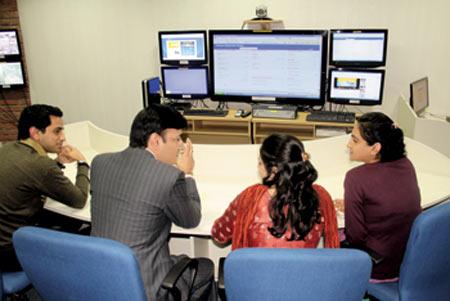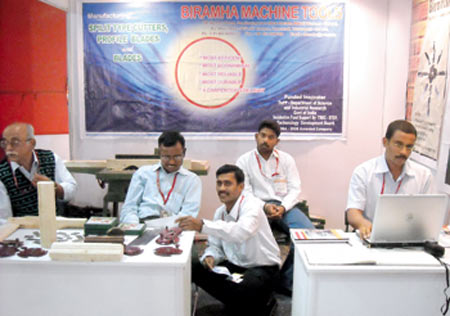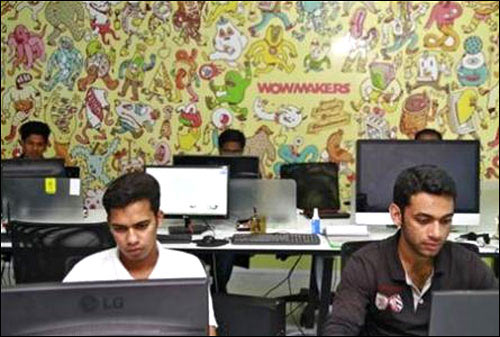Photographs: Courtesy Careers360 Shipra Abraham, Careers360
Mentors with domain knowledge are helping young entrepreneurs fulfill their dreams while they are still in college.
All of us have heard of HP, a brand popular for a range of computer hardware and other IT-based accessories.
Two electrical engineering students of Stanford University, Hewlett and Packard, transformed their idea of this company during their fellowship under the mentorship of a professor in 1939.
They started it in a one-car garage with an initial investment of 538 US dollars and in around a decade HP was incorporated.
A similar case can be found in India where students of IIT-Madras created Midas Communication Technologies in 1994 and brought about the wireless communication revolution in the country.
These are examples of how universities have been playing a major role in entrepreneurship.
Gone are the days when education was limited to theory and a few-hours of practicals.
The education domain is spreading its wings and encouraging students to think beyond and establish themselves as founders and owners.
To achieve this aim, incubators were set up.
These centres help not only in the growth of technology-based new enterprises but also in improving their survival rate substantially.
They are open for individuals or groups of any community and regions who can approach them directly through e-mails, walk-ins and phones.
Some such establishments include the Innovation and Entrepreneurship Development Centres (IEDC), Science and Technology Entrepreneurship Development (STED) Projects, Science and Technology Entrepreneurs Parks (STEP) and Technology Business Incubators (TBI).
Although some of these units are hosted in universities, they are a totally different entity as a registered Not for Profit Section (25) Company and the board is not dominated by the university management.
Please click NEXT to continue reading....
Universities provide free office spaces, funds or extend legal support
Image: The central lab facility for Biotechnology based Incubatee at KIIT TBIPhotographs: Courtesy Careers360
Range of services
Services provided by these mentor centres aim at realising a venture idea into a successful commercial venture.
The help varies from physical to mental support in the form of business training, technology assistance, handholding, mentoring, physical space, technical infrastructure, basic start-up funds, legal support, and importantly networking at both national and international level.
Sometimes, rent-free space for a few months is provided, depending on the case. The tenant companies have to leave the incubator space within two-three years. In return, the incubatee pays some money either as rent fee or commission.
At KIIT TBI, the rent starts from Rs 3,000 per month to Rs 8000 per month whereas at the SIDBI Innovation and Incubation Centre (SIIC) at the Institute of Information Technology, Kanpur, the incubator is provided a stake in the company.
"The incubatee gives three percent stake to the institute and one percent to the mentor in the company," says Sudha Selvaraj, Manager, SIIC, IIT-Kanpur.
Capital support
To fund start-ups, these incubators receive grants from the government in terms of technology facilities while the institutions/co-promoters are expected to provide land and building.
RMP Jawahar, Executive Director of TREC-STEP at NIT-Trichy, says that the first five years' recurring expenditure is provided by the government and after this, incubators have to generate their own resources as self sustaining ventures.
"New Seed Funding instruments are also launched by various Ministries for the benefit of young start-up entrepreneurs from time to time. NSTEDB provides up to Rs 50 lakh seed fund (soft loan) support for entrepreneurs while Technology Development Board provides Rs 25 lakh seed fund through the concerned incubators. For developing innovative prototypes processes, Department of Scientific Industrial Research also provides Rs 15 lakh for developing innovation and another Rs 45 lakh for commercialising them as 50 per cent cost support for select innovations. The Ministry of Finance has provided Service Tax exemptions for young start-ups and for the hosting incubators up to a certain ceiling," he added.
Gingr, a case in point
Image: Designing mobile apps have become quite a rage among college entrepreneursPhotographs: Will Burgess/Reuters
Gingr is a mobile messenger that lets you interact with the businesses around you through text messages.
Be it a restaurant, florist, gym or salon, no more calling them.
Gingr delivers your message to that business and ensures that you receive a quick response. Such a solution provider is jointly brought by three students of IIT Delhi -- Himanshu Bamoria, Himanshu Geed and Suneet Choudhary.
Gingr is their second venture together. Himanshu Bamoria says that in 2012 Gingr got shortlisted for India's multi-city accelerator programme Global Superangels Forum.
During that eight- week programme, Gingr was grilled on every aspect including the idea, business model, marketing strategy and customer acquisition.
It was mentored by prominent entrepreneurs of Internet and mobile industry.
So far, Gingr has raised 28,000 US dollars from GSF Superangels.
Availing the incubator services
Image: Incubators provide you guidance and help you gain visibility for the productPhotographs: Courtesy Careers360
The various services are availed of by incubatees in varying permutations and combinations.
GVC Systems, an electronics product design and development company, has rented an entire office room at Amity Innovation Incubator.
Its CEO, Vinay Chadda, recalls that when he first approached the centre, his company was short of funds. But the centre believed in his business plan.
Since then the company has successfully designed several products including traffic light systems, vending machines and power monitoring devices.
Visibility and guidance are two top perks, shares Gauravv Mittal, Managing Director of ITCONS e-solutions, which has its office at the Amity Incubator premises.
Gauravv is referring to the several CEOs, entrepreneurs and investors who frequent the incubator premises, as well as the workshops that are regularly conducted.
These cover a range of topics relevant to entrepreneurs, from corporate governance, goods and service tax to social media and to master classes on due diligence.
Some companies don't need an office space and only avail of the incubators' virtual incubation platform.
For instance, patent consulting is one such service offered and a team of IPR professionals process this service.
Bringing home the jobs
Image: Entrepreneurs have an additional responsibility of generating employmentPhotographs: Sivaram V/Reuters
An incubation centre gives a different identity to the host institution.
It improves their entrepreneurial and innovation culture.
On one hand it helps the faculty to explore the possibility of commercialising their research findings and on the other it helps the students develop their entrepreneurial talents.
This in turn provides an opportunity for the institute's knowledge resource to sync with the latest developments in the technology market and brings cutting edge knowledge to faculty, improving the entrepreneurial and innovation culture.
The SIIC has a faculty entrepreneurship policy.
Through the incubation centre, four such faculty-owned ventures have achieved their dreams.
"If the students who take up entrepreneurship succeed in developing enterprises, they create jobs for others. They generally take their classmates or juniors and others try to follow the same," says Dr Mrutyunjay Suar, CEO, KIIT-TBI, the only incubator in Odisha.
Challenges of mismanagement
Image: Lack of good business exposure can lead to failurePhotographs: Sivaram V/Reuters
It's said, "Many great ideas have been lost because the people who had them could not stand being laughed at."
The saying goes true for many start-ups which though begin with a bang but sooner or later face shut-down.
A team with a good idea never wants to fail.
Dr Suar observed that businesses fail when the business touch is missing, even though the idea is good with high-end technology.
"If more failures come from a host institution then the flow of incubatees stops," he adds.
This leads to more problems like loss of time, resources and reputation.
"Mismanagement is very frequent in the academic world since they lack business exposure, at least in India," adds Jawahar.
Lack of innovation and government support
Image: India needs more research and innovation labsPhotographs: Alyssa Banta/Newsmakers/Getty Images
All said and done, there is much needed to be improved as far as incubation is concerned in India.
National Science and Technology Entrepreneurship Development Board (NSTEDB) under the Department of Science and Technology, Government of India, is the one responsible for setting up these incubators.
Scaling up the number of incubators is an absolute must. Compared to China, which has nearly 800 incubators, the United States 1000 incubators and South Korea nearly 500 incubators, India has only 100 incubators.
This is very low and needs urgent scaling up. Incubators' support for only five years is unrealistic and needs a review.
More support from the Government is also essential. Dr Suar feels that separate fellowships should be awarded to promote innovation and entrepreneurship like those in research and development.
Moreover, co-ordination with various departments promoting innovation and incubators is essential for building synergistic uplift.
Over reliance on academic incubation needs to be reviewed.
More stand alone initiatives with knowledge linkages have to be encouraged.
Innovation in incubation is essential.
A new look at HR policies for incubators are required for nurturing the spirit of innovation and entrepreneurship in the country.
What it takes to build a great start-up
Image: Motivation, determination and patience is important for successPhotographs: Reuters
Impatience kills start-ups, says start-up and turn around expert Vicky Narang, a commercial pilot and mentor at the IITs and IIMs to aspiring student entrepreneurs for past five years.
He shares (through his experience), what one needs, along with resources.
"A business start-up is like a baby. The way a baby learns to crawl, stand up, walk and fall; a business venture experiences these twist and turns too. Constant motivation, determination and patience are prerequisites. You have to wait for results to come."
To cite an example, there was a students' group working on an innovative idea to make dumbbells.
India has not been able to incorporate that technology yet as it costs too much. One team member was very energetic and capable enough to come out with solutions immediately to any challenge.
With such talent and innovative ability, he had to give the idea time to develop and earn rewards. A-.
This calls for team management. This is where it gets tricky, when grilling and testing, clashes of ego take place. It's all a part of the entire journey.
Different viewpoints are significant but it's important to collaborate and take a decision. Also, if any view point is contrary to the decision taken, the team should be supportive enough to understand, accept and go along with it.
Self-presentation skill is another substantial need.
You might have a record-breaking academic background, enough money and a fruitful business idea but if you go out to meet people dressed in jeans and a tee shirt thinking that's cool, you're in for a surprise.
I feel a changeover from today being a college student enjoying coffee in a canteen to tomorrow being an employee sitting with a colleague and having lunch is not coming through.
Despite having the basic finance or HR knowledge, they usually don't know what and how to speak, or when to speak. They are young, which is brilliant, but somewhere their minds are still not well versed with conversing with a particular person who might fund their project.
These are not the only things but these are small things which a person who is funding notices because tomorrow his/her name would be associated with your company and it would be a part of that ecosystem.
You would be called up because a company has funded you and if you are able to present yourself well, you can present your product well.
First you sell 'you' as a brand. A few years later the brand (product) starts selling and becomes a Parle or Maggi. It's highly recommended to maintain an overall quality.









Comment
article